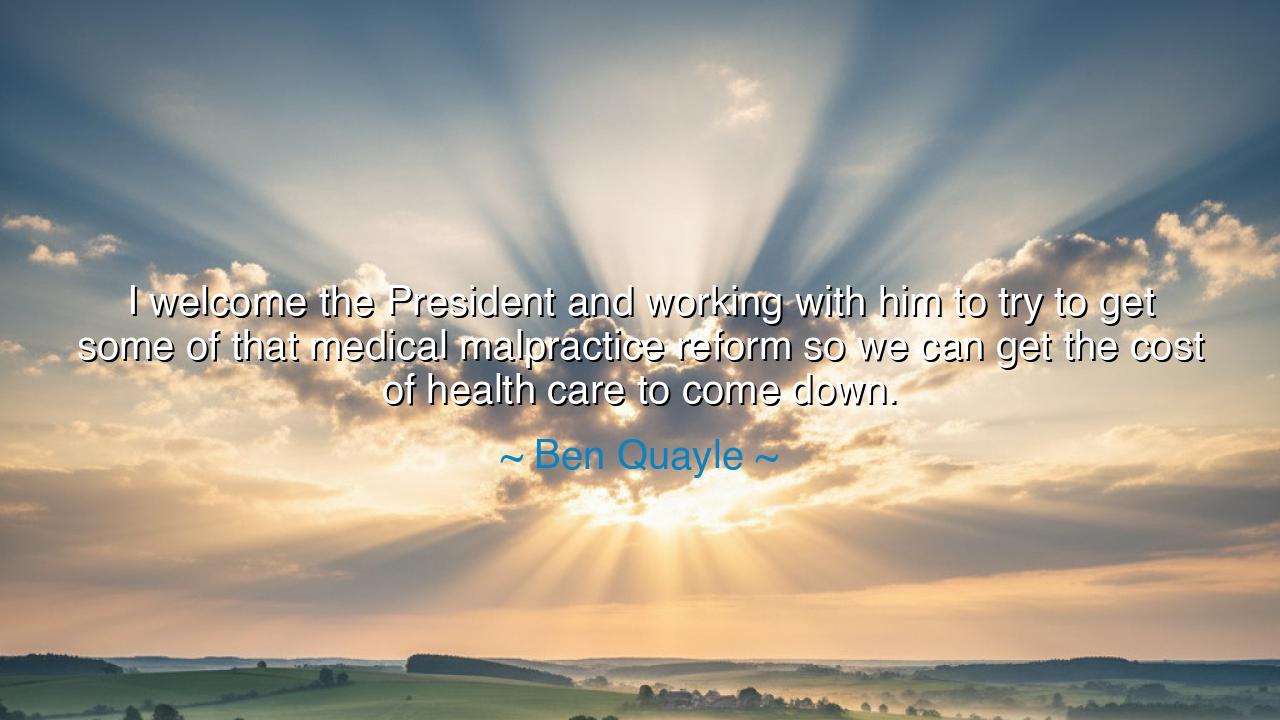
I welcome the President and working with him to try to get some
I welcome the President and working with him to try to get some of that medical malpractice reform so we can get the cost of health care to come down.






Hearken to the words of Ben Quayle, a voice raised in the halls of governance, seeking the balance between justice and the welfare of the many. He declares that he welcomes the President and working with him to try to get some of that medical malpractice reform, aiming toward the noble goal that the cost of health care may come down. In this declaration, one perceives the timeless struggle of humanity: the reconciliation of responsibility, fairness, and the common good. He speaks not only of policy, but of the moral imperative to alleviate suffering and ensure access to care for all citizens.
Since the dawn of civilization, rulers and advisors have grappled with similar dilemmas. In the courts of ancient Rome, magistrates sought laws that balanced accountability with mercy, striving to protect the innocent while preventing excessive punishment. Quayle’s words echo this wisdom: the systems of justice must neither crush the healer nor neglect the patient. The pursuit of medical malpractice reform is thus a modern expression of an ancient principle—structuring society so that fairness and care coexist.
Consider the historical figure of Hippocrates, whose oath sought to protect both healer and patient. Physicians were charged with the duty to heal, yet also with the responsibility to do no harm. Over time, as errors and misjudgments led to disputes, society has struggled to craft mechanisms that uphold both trust and accountability. Quayle’s pursuit of reform echoes this eternal tension: how might society preserve the integrity of healing while protecting those wronged by human fallibility?
The economic dimension is equally profound. High costs of health care burden both the vulnerable and the collective. When legal disputes escalate unchecked, the expense ripples outward, limiting access and eroding the stability of communities. By seeking reform, Quayle engages in a timeless task: to balance the scales of justice so that neither fairness nor the public good is sacrificed. The ancients recognized that governance must harmonize the needs of the individual with the health of the whole polis.
The modern world offers lessons in both peril and promise. In states or societies where medical practitioners face crippling legal consequences, innovation stalls, and the sick often pay the price. Conversely, when thoughtful reform protects both healer and patient, the result is affordable, accessible, and effective care. History, from the guilds of medieval Europe to contemporary healthcare systems, demonstrates that structural wisdom and collaborative governance are essential to ensure that responsibility does not become tyranny, and that protection does not stifle service.
Quayle’s willingness to work with the President underscores another enduring principle: the pursuit of justice and public welfare is a collective endeavor. Individual ambition or partisan interest must yield to shared purpose. From the councils of Athens to the parliaments of England, the enduring truth remains: cooperation between leaders, when guided by principle, produces laws and reforms that elevate the well-being of all.
The practical lesson emerges for citizens and leaders alike: seek solutions that honor both accountability and compassion. Engage in dialogue across divisions, recognize the costs borne by both healer and patient, and craft policies that reduce unnecessary burden while ensuring justice. By reforming systems with care and foresight, society can lower costs, enhance trust, and improve the health of the community, fulfilling the ancient charge to govern with wisdom and mercy.
Thus, heed the words of Ben Quayle as more than political discourse: let them illuminate the path of reasoned action. Strive for reform that is just, for policies that are measured, and for cooperation that prioritizes the health and well-being of the many. In balancing responsibility and compassion, fairness and accessibility, we honor both the healer and the healed, creating a legacy of enduring justice and practical wisdom for generations yet to come.






AAdministratorAdministrator
Welcome, honored guests. Please leave a comment, we will respond soon